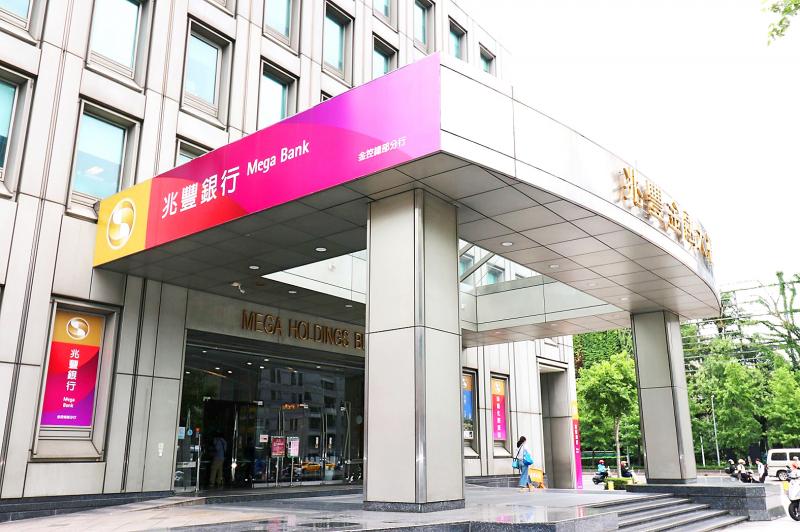State-run Mega International Commercial Bank (兆豐銀行) was yesterday fined NT$10 million (US$360,972) for its lax internal control over 28 mortgages totaling NT$350 million, whose applications were made by dummy accounts, the Financial Supervisory Commission said.
Mega Bank became the nation’s third bank to be punished for failing to detect mortgage applications made by dummy accounts. Hua Nan Commercial Bank (華南銀行) was fined NT$3 million in 2016 for offering mortgages to 34 figurehead accounts, some of whom belonged to vagrants, and Hwatai Bank (華泰銀行) was fined NT$3 million in 2018, commission data showed.
“It seems that this specific type of mortgage fraud has not been effectively curbed among local banks, ” Banking Bureau Deputy Director-General Huang Kuang-hsi (黃光熙) told a videoconference in New Taipei City.

Photo: Lee Chin-hui, Taipei Times
An employee surnamed Shih (石) working at Mega Bank’s Sindian branch (新店) in New Taipei City approved the mortgages from July in 2015 to the end of 2019.
However, the lender last year found in an internal audit that the mortgage applications were made by figureheads who used funds from a third party to repay the loans, Huang said.
Shih did not review the applicants’ profiles or conform to the bank’s loan approval criteria while approving the applications, and even helped transfer the third-party deposit money into the dummy accounts, he said.
Prosecutors have been working on the case since last year and have charged Shih, her ex-husband, surnamed Hsu (許), and a land administration agent surnamed Chou (周) with contraventions of the Banking Act (銀行法) and fraud, local media reported.
Shih reportedly worked with Hsu, who was a real-estate agent, and allegedly colluded with Chou to inflate the prices of the apartments she bought in Taipei and New Taipei City to obtain higher mortgages, and used the loan to buy other properties, local media reported.
Huang did not provide further details, but said that Mega Bank has made many mistakes in the mortgage operations, including incorrect collateral appraisal, and allowing the same employee to review loan applications and appraise collateral.
Mega Bank has estimated that it would likely incur a loss of NT$22 million due to the 28 problematic mortgages, Huang said.

To many, Tatu City on the outskirts of Nairobi looks like a success. The first city entirely built by a private company to be operational in east Africa, with about 25,000 people living and working there, it accounts for about two-thirds of all foreign investment in Kenya. Its low-tax status has attracted more than 100 businesses including Heineken, coffee brand Dormans, and the biggest call-center and cold-chain transport firms in the region. However, to some local politicians, Tatu City has looked more like a target for extortion. A parade of governors have demanded land worth millions of dollars in exchange

An Indonesian animated movie is smashing regional box office records and could be set for wider success as it prepares to open beyond the Southeast Asian archipelago’s silver screens. Jumbo — a film based on the adventures of main character, Don, a large orphaned Indonesian boy facing bullying at school — last month became the highest-grossing Southeast Asian animated film, raking in more than US$8 million. Released at the end of March to coincide with the Eid holidays after the Islamic fasting month of Ramadan, the movie has hit 8 million ticket sales, the third-highest in Indonesian cinema history, Film

Taiwan Semiconductor Manufacturing Co’s (TSMC, 台積電) revenue jumped 48 percent last month, underscoring how electronics firms scrambled to acquire essential components before global tariffs took effect. The main chipmaker for Apple Inc and Nvidia Corp reported monthly sales of NT$349.6 billion (US$11.6 billion). That compares with the average analysts’ estimate for a 38 percent rise in second-quarter revenue. US President Donald Trump’s trade war is prompting economists to retool GDP forecasts worldwide, casting doubt over the outlook for everything from iPhone demand to computing and datacenter construction. However, TSMC — a barometer for global tech spending given its central role in the

Alchip Technologies Ltd (世芯), an application-specific integrated circuit (ASIC) designer specializing in server chips, expects revenue to decline this year due to sagging demand for 5-nanometer artificial intelligence (AI) chips from a North America-based major customer, a company executive said yesterday. That would be the first contraction in revenue for Alchip as it has been enjoying strong revenue growth over the past few years, benefiting from cloud-service providers’ moves to reduce dependence on Nvidia Corp’s expensive AI chips by building their own AI accelerator by outsourcing chip design. The 5-nanometer chip was supposed to be a new growth engine as the lifecycle